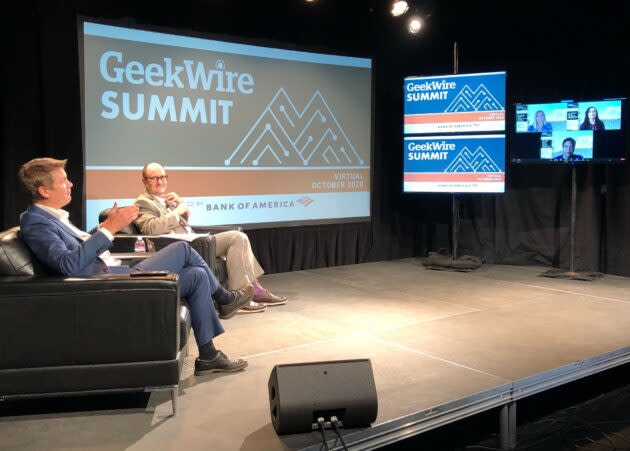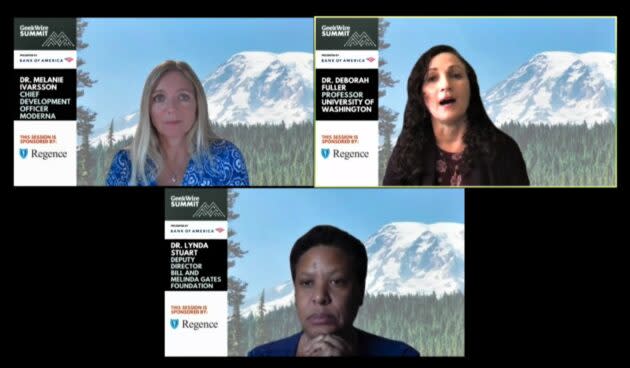Experts foresee triumphs and tragedies in worldwide quest for COVID-19 vaccine

The good news is that Operation Warp Speed, the multibillion-dollar effort to develop vaccines for COVID-19, is moving ahead at a pace that justifies its name.
The bad news is that despite all that effort, the coronavirus outbreak is still likely to be with us next year — and low- to medium-income countries such as India are likely to be hit particularly hard.
“We’re going to probably see a lot of deaths,” said Lynda Stuart, deputy director for vaccines and human immunobiology at the Bill & Melinda Gates Foundation. “It’s going to be a great inequity and tragedy that will unfold.”
Stuart and other experts involved in the vaccine quest laid out their assessment of the road ahead today during the first session of the 2020 GeekWire Summit.
The fact that the annual summit’s first session focused on the pandemic was apt, and not just because beating COVID-19 is the top issue facing the world today.
Safety concerns forced the GeekWire Summit to go totally virtual for the first time in its eight-year history — and you just knew there had to be a few technical glitches to overcome. (Any attendees who weren’t able to stream the panel live can access it on-demand in the event platform.)
Any technical challenges that cropped up during today’s panel would pale in comparison with the challenges being faced by Stuart and her two fellow panelists: Melanie Ivarsson, chief development officer for Moderna; and Deborah Fuller, a vaccinologist at the University of Washington.

“I’ve never worked this fast in my life, or this hard, and it’s as if everything’s moving super-fast,” Fuller said. “And yet, at the same time, it feels like it’s just one long, nine-month day.”
Fuller has been studying how the coronavirus behind COVID-19 spreads, and how next-generation vaccines can stop it. Ivarsson’s company, meanwhile, has been racing to test and distribute one of those next-gen, RNA-based vaccines. Moderna’s vaccine candidate went through its first clinical trial in Seattle, and the company is just about to finish enrolling 30,000 volunteers for the crucial Phase 3 trial.
“We are trying to save the world, and it’s a very exciting way to spend your day,” Ivarsson said.
The course of the COVID-19 vaccine race hasn’t always run smooth: One company, AstraZeneca, had to pause its Phase 3 trial last month when one of the participants suffered an unexplained illness. Johnson & Johnson paused its trial this week for similar reasons.
Ivarsson said Moderna’s vaccine development program has continued on track, but she stressed that safety is the primary concern for all of the companies involved in Operation Warp Speed. Decisions on whether to hold up a trial, and when to resume testing, are up to an independent review panel.
“That group is looking at our data as well,” Ivarsson said.
In the weeks ahead, clinical trials may progress far enough for the Food and Drug Administration to issue emergency use authorizations for promising vaccine candidates. But Ivarsson stressed that such an authorization would be only an interim step toward getting a vaccine widely distributed.
Operation Warp Speed is investing billions of dollars in ramping up production of vaccine candidates, even before they’re fully proven, to jump-start the distribution progress. Even so, Stuart said vaccine availability was likely to be highly limited in the early stages, with healthcare workers getting top priority.
All three experts expected COVID-19 vaccines to make their appearance in the United States by mid-2021, but getting the vaccine to patients will require a massive public health campaign.
“I think that vaccines are going to have to be made free to the individual, to recipients,” Fuller said during a VIP session for Summit attendees. “There’s great motivation for that. You look at the great economic toll that COVID has had. I think that businesses, I think governments, I think they will all be very motivated to try to get this to as many people as possible.”
One of the challenges involves convincing people that the vaccines are truly safe, and countering claims from conspiracy theorists. “It’s going to be a complicated time for everybody,” Ivarsson acknowledged.
Another big challenge has to do with what happens beyond U.S. shores. Stuart said some parts of the world may not get full access to stores of vaccine until 2022 or even 2023 — which sparked the pessimistic part of her prediction for 2021.
The most hopeful development in the COVID-19 crisis so far has to do with how quickly the scientific community has mobilized to fight it.
“In all the years that I’ve done vaccine research, I have never seen so much promising data, so many different candidate vaccines. … The data has been really very impressive,” Fuller said.
Ivarsson said Moderna is already looking into how the techniques that were developed for its COVID-19 vaccine can be applied to other infectious diseases such as seasonal flu — or even combinations of flu strains.
Could it be that epidemiologists will look back at the Great Pandemic of 2020 as the best of times as well as the worst of times? Fuller wouldn’t go that far, but she said there’s an obvious silver lining to the outbreak.
“I hope that this coronavirus is a wakeup call for the future in terms of actually being prepared for the next pandemic,” she said. “There will be another pandemic. There always is.”
More from GeekWire:
Pfizer’s promising COVID-19 vaccine is good news for Moderna’s trials, Fauci says
Coronavirus and the future of vaccines: Inside the quest to develop faster responses to epidemics
Infectious Disease Research Institute is working on a multiplier effect for coronavirus vaccine
Disease experts say it’s time to join forces to make coronavirus vaccines

